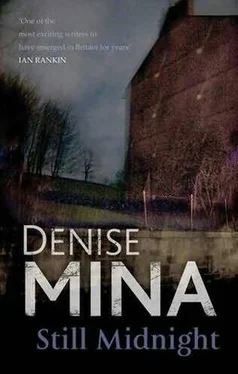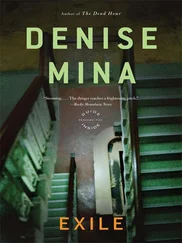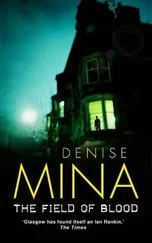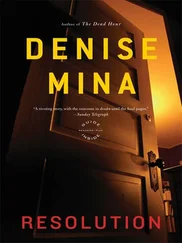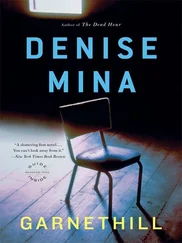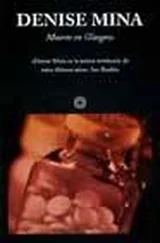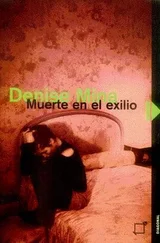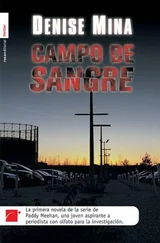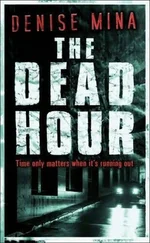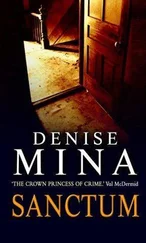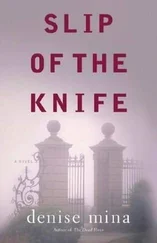Go on, Ammy.
He looked at her, skin slack on her jaw, the impossibly silken skin on her underarms, her long lashes. Aleesha had her lashes.
Keeping his eyes on the door, he swung his legs to the left side of the bed, stood up swiftly and found his nose an inch from the grey curtain. He could see out into the street. His heart was thumping in his chest, his neck stiff with fright.
‘ A street,’ he told her.
Badly overgrown, the garden had huge hedges, once cared for, now bursting up and out, over a broken-up concrete driveway and wind-flattened grass. It was a short garden, council probably, and steep. The dark green grass was littered with rubbish: bits of plastic, sun-faded Tennant’s cans, cardboard boxes melting in the rain. Straight across the street were houses that he supposed matched this one, double storey council houses with black slate roofs and picture windows on the ground floor. One of those dying council estates like they had in Glasgow.
Looking beyond the roofs of the neighbourhood houses he was surprised to see hills. Neither Manchester nor London had great big proud hills like that. Those were Scottish hills and he recognised them. He blinked and looked again. Castlemilk. The high flats, the water tower, Cathkin Brae. He shut his eyes and tried to remember, then opened them again and saw that he was right. He was on the south side of Glasgow, half a mile from home. His uncle lived near here when they first arrived, in a prefab in Prospecthill. He used to stand in his kitchen and look at this view. Heart racing, Aamir realised that he could walk home from here, or catch a ninety bus. At a push he could walk to his own shop from here.
‘Near!’ he said triumphantly.
On the bed his mother covered her mouth and laughed softly, happy because he was happy.
Aamir smiled. If they came in now and shot him, if they both came in and beat him all over he would care less, fear less, hurt less, because the shop, the shelves full of things he had chosen, priced and catalogued, the little prayer area in the back room, the stickers on the door, the sweet rack he had stacked, the world of order he had created, refined, savoured over the decades, it was all close by.
‘My shop,’ he told his mother, ‘is here.’
The street was quiet, but they must be near the main road because he could hear traffic. Buses, possibly even number nineties, were passing by, taking people to the town, to Langside, to Rutherglen and the Asda.
Movement in the street: a thin figure in a white tracksuit and cap scurried around the hedge, hurrying up the steep drive. He was carrying a heavy blue plastic bag, clutching it tight to his chest. From the outline Aamir guessed it contained lager cans. The skip of the cap made it impossible for the man to see up but Aamir stepped back from the window anyway, watching as the figure approached the front of the house. He listened for the door opening, but heard nothing. The man must be going around the side.
He stood back from the window, listening for movement in the house. If they drank a bag load of cans between them they might get sleepy; Aamir could leave without a fuss, he could walk home to the shop.
Thinking these things he only gradually became aware of the purr of the engine. The road was empty and for a moment he thought that the wind was changing, carrying sounds, but then he saw the car stop in the road at the bottom of the driveway.
‘Maman!’ he whispered urgently. ‘Maman!’
She looked over his shoulder, standing close but not touching him, she looked out and she saw the police car too.
‘Marvellous, Ammy,’ she said, and was suddenly back on the bed.
Aamir watched the car brace itself as the handbrake was pulled on. The driver’s door opened and a leg stepped out onto the street.
Aamir turned around and scrambled back onto the bed next to his mother. He pulled the pillowcase down over both their heads, pulled his knees up to his chest, and held his breath: the police were coming to save them.
All they had to do was wait.
Morrow sat in the slowly cooling car, staring at the blank wall in the yard at London Road. She couldn’t cite Danny as a source. She couldn’t let it be known that he was her half-brother. Police liked the absolute value of ‘them and us’ and she and Danny looked so alike, the slightest suspicion would prove the relationship. But Bannerman was determined to ignore the lead and, even if it did pan out, he wouldn’t credit her with it. She had to tell MacKechnie without looking underhand.
Stepping out of the car she locked it and walked up the ramp to the security door, feeling her heart rate slow as she reached for the security pad. She always felt calm before she entered the station, the balm of order. Behind the door she knew which desks would be manned, who was responsible for which job, who to look up to, who to piss down on. Sometimes when she was lying awake in bed at home she put herself here, outside the door.
She punched the code in, the door buzzed in front of her and fell open. Through the processing bar and the lobby she reminded herself Danny had given her important information and ambition wasn’t met by giving leg-ups to rivals. She needed to stop, make a plan.
The disabled toilet in the lobby was empty and she sloped in and locked it, lowering the toilet lid and sitting down. She needed to give the information at a time and in such a way that she would be acknowledged as the source. Couldn’t mention Danny but needed to give the information in front of MacKechnie, while Bannerman was there. She needed them together.
Shutting her eyes she saw the Blair Avenue red front door again. She snapped her eyes open and stood up, stepped over to the low sink and glared at herself in the mirror. Red eyes, blue shadows under them, bitterness twitching around her mouth. She was starting to look as sour as her mother.
Avoiding eye contact with the mirror she made herself tidy, smoothed her hair back. Now wash your hands. Turning the tap on she was ambushed by the image of chubby fingers under clear running water, fingers flexing curiously, savouring the new feel of it. She shut her eyes, threw her head back, opened them. Scrawled in biro, in tiny writing at the side of the mirror, someone had graffitied ‘TJF’.
Morrow snorted furiously, scooped water from the running tap and threw it at the wall. She snatched green paper towels from the dispenser, spilling them on the floor, and scrubbed at the writing. The fury passed and she took her hand away. The letters were slightly fainter, not by much. TJF. A catchphrase officers used to denote the death of morale, an excuse for shoddy work and buck-passing, the death of order. TJF: The Job is Fucked.
She squeezed hand soap from the dispenser and rubbed it on the letters, scrubbing again, using wet towels this time. Even fainter. She wiped the blue soap off the wall and ran her hands under the water to get the residue off, keeping her eyes on the letters, directing all her anger and focus on them.
Picking up the scattered green paper towels, she dried her hands, unlocked the door and threw it open so it bounced off the wall, striding across the lobby to the front bar. She pressed the doorbell strapped to the desk, staring at herself in the mirrored wall, knowing they were back there looking at her.
The duty sergeant must have sent him: a young copper came out with a pained expression on his face. She pointed back to the toilet. ‘Have you been in there recently?’
He had been relaxed back there, and it took him a moment to adjust his mood. ‘Sorry?’
Morrow glared at him.
‘Sorry, ma’am, been in where?’
‘Disabled toilet. On the wall.’
He frowned over at the toilet. ‘The wall?’
‘In the toilet. Graffiti on the wall. Was it you?’
Читать дальше
